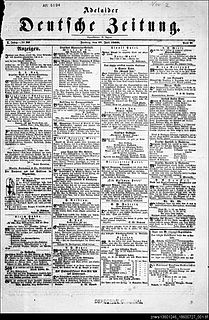 W
WThe Adelaider Deutsche Zeitung was a German language newspaper published in Adelaide, capital of the Colony of South Australia from 1851 to 1862.
 W
WCollinsvale is a rural / residential locality in the local government areas (LGA) of Glenorchy (75%) and Derwent Valley (25%) in the Hobart and South-east LGA regions of Tasmania. The locality is about 11 kilometres (6.8 mi) west of the town of Glenorchy. The 2016 census provides a population of 630 for the state suburb of Collinsvale.
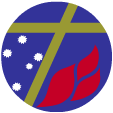 W
WThe Lutheran Church of Australia (LCA) is the major Lutheran denomination in Australia and New Zealand. It counts 540 congregations and 30,026 members according to official statistics. It was created from a merger of the Evangelical Lutheran Church in Australia and the United Evangelical Lutheran Church of Australia in 1966.
 W
WBarossa German is a dialect of German, predominantly spoken in the Barossa Valley region of South Australia. The prominent South Australian writer, Colin Thiele (1920–2006), whose grandparents were German immigrants, referred to "Barossa-Deutsch" as: "that quaintly inbred and hybrid language evolved from a century of linguistic isolation". It takes its name from the Barossa Valley, where many German people settled during the 19th century. Some words from Barossa German have entered South Australian English.
 W
WThe Barossa Valley is a valley in South Australia located 60 kilometres (37 mi) northeast of Adelaide city centre. The valley is formed by the North Para River. It is notable as a major wine-producing region and tourist destination.
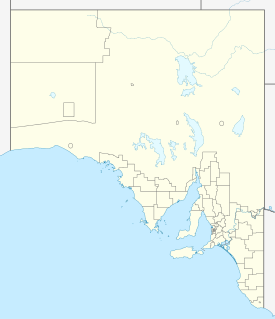 W
WBethany is a small village about 2 km south-east of Tanunda in the Barossa Valley. It was originally named Bethanien or sometimes Neu Schlesien - New Silesia, but was changed during the First World War in an attempt to remove all German place names from Australia. Similarly, the German-language school was forced to close by the state government in 1917, with 60 students at the time.
 W
WThe East Melbourne Hebrew Congregation, also known as East Melbourne Shule, East Melbourne Synagogue, Melbourne City Synagogue or City of Melbourne Synagogue is a historically significant Jewish congregation in East Melbourne, Victoria, Australia. The synagogue, consecrated in 1877, is the oldest in Melbourne.
 W
WDuring World War I in Queensland, Australia, enemy aliens were frequently arrested and detained. Strong anti-German sentiment resulted in many arrests and investigations. German place names in Queensland were frequently renamed with British names.
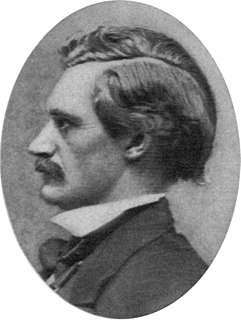 W
WThe Forty-Eighters were Europeans who participated in or supported the revolutions of 1848 that swept Europe. In the German states, the Forty-Eighters favored unification of the German people, a more democratic government, and guarantees of human rights. Disappointed at the failure of the revolution to bring about the reform of the system of government in Germany or the Austrian Empire and sometimes on the government's wanted list because of their involvement in the revolution, they gave up their old lives to try again abroad. Many emigrated to the United States, the United Kingdom, and Australia after the revolutions failed. These emigrants included Germans, Czechs, Hungarians, and others. Many were respected and politically active, wealthy, and well-educated. A large number went on to be very successful in their new countries.
 W
WThe German Club was a private club founded in 1853 and located in Sydney, New South Wales, at 89 Phillip Street. Its membership was men-only and was the oldest gentlemen's club in Australia catering specifically to the German-Australian community prior to the First World War, upon which by 1915 it had closed amid a tide of Anti-German sentiment in Australia.
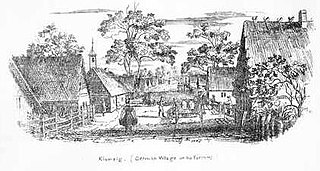 W
WGerman settlement in Australia began in large numbers in 1838, with the arrival of immigrants from Prussia to Adelaide, in the then colony of South Australia. German immigrants became prominent in settling South Australia and the Queensland. From 1850 until World War I, German settlers and their descendants comprised the largest non-British or Irish group of Europeans in Australia.
 W
WHahndorf is a small town in the Adelaide Hills region of South Australia. Currently an important tourism spot, it has previously been a centre for farming and services.
 W
WThe Harmonie German Club is a social club in Canberra, Australia founded and built by German migrants, including the "Jennings Germans", in the early 1960s. In the mid 1960s migrants and their children made up half of Canberra's 80,000 population. Community clubs, including for example those founded by Italian, German and Polish migrants, were recognised as important for welcoming new settlers, providing venues to socialise and reminisce.
 W
WKegel, or kegeln, is a German bowling game, in which a player rolls a wooden or plastic ball along a smooth, hard indoor lane. The object of the game is to knock down the nine kegels at the other end of the lane. Kegel is a German derivative of European nine-pin bowling and is therefore closely related to its American counterpart, and bear similar elements to the traditional ten-pin bowling. It was also introduced to South Australia by German settlers in the 19th century and remains popular in areas in which many German people settled, such as the Barossa Valley.
 W
WKlemzig is a suburb of Adelaide in the City of Port Adelaide Enfield. It was the first settlement of German immigrants in Australia and was named after the village of Klemzig in what was then German Prussia and is now Klępsk in western Poland.
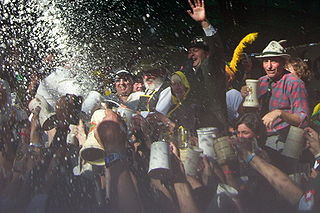 W
WThe Oktoberfest is a two-week festival held each year in Munich, Germany during late September and early October. It is attended by six million people each year and has inspired numerous similar events using the name Oktoberfest in Germany and around the world, many of which were founded by German immigrants or their descendants.
 W
WIn Australia, a number of German settlements in the Riverina were established in the late nineteenth century. The settlements were populated by Germans migrating both from established German settlements in South Australia and directly from Germany. Due to the distinct religious and language difference between the new settlers and the established Anglo-Celtic community in the Riverina, these settlements maintained a distinct cultural identity.
 W
WSängerfest, also Sängerbund-Fest, Sängerfeste, or Saengerfest, meaning singer festival, is a competition of Sängerbunds, or singer groups, with prizes for the best group or groups. Such public events are also known as a Liederfest, or song festival. Participants number in the hundreds and thousands, and the fest is usually accompanied by a parade and other celebratory events. The sängerfest is most associated with the Germanic culture. Its origins can be traced back to 19th century Europe. Swiss composer Hans Georg Nägeli and educator Carl Friedrich Zelter, both protégés of Swiss educator Johann Heinrich Pestalozzi, established sängerbunds to help foster social change throughout Germany and Prussia. University students began to choose the art form as an avenue for political statements. As the sängerfest concept gained popularity and spread around the world, it was adapted by Christian churches for spiritual worship services. European immigrants brought the tradition in a non-political form to the North American continent. In the early part of the 20th century, sängerfest celebrations drew devotees in the tens of thousands, and included some United States presidents among their audiences. Sängerbunds are still active in Europe and in American communities with Germanic heritage.